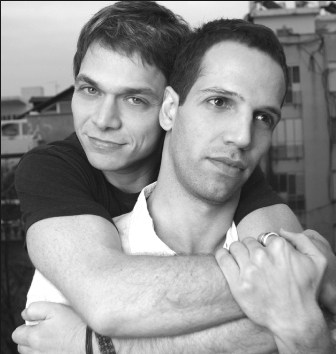By Leonard L. Quart
Eytan Fox is an Israeli director whose last film, the skillfully crafted and entertaining “Walk on Water,” a thriller with a gay subtext, became the most successful Israeli film ever shown abroad. All the Eytan Fox directed films I have seen, whatever else they are about, deal very openly with gay sex and love. (An earlier work, “Yossi and Jagger,” depicted the love affair between two officers in the Israeli army.)
Fox’s latest, “The Bubble,” is no different. It begins breezily with a lot of talk and banter between three Israeli roommates — two gay men, Yali (Alon Friedman), and Noam (Ohad Knoller), and a heterosexual woman, Lulu (Daniela Virtzer) — about their respective lovers.
They live in a hip section of Tel Aviv filled with book and record shops, theaters, and cafes. Yali is a campy restaurant manager, and the handsome, more sensitive and reflective Noam is a record store clerk who resentfully serves part time in the National Guard. The third member of the group, Lulu, is a vivacious, cheeky, aspiring clothes designer. Yali and Lulu’s romantic relationships are not that different from those one sees on TV sitcoms like “Friends,” except the sex is rawer and leaves much less to the imagination.
The most passionate relationship takes place between Noam and a soulful, gay Palestinian Ashref (Yousef Sweid), who is staying in their apartment illegally. However, the dynamic and tone of their relationship is much less interesting than its reverberations. Ashref comes from the West Bank city of Nablus — a place where he must hide his sexual identity or be destroyed. He must deal with the reality that his gayness repels even his university-educated sister, with whom he shares a close, loving relationship. It’s a world where one must adhere to prescribed, traditional roles, and no room for sexual freedom exists. Ashref is a poignant figure, conscious that he is trapped between an Israel whose harsh, dehumanizing border checkpoints serve as a buffer against Arab attack and his free movement, and a West Bank where terrorism and traditionalism reign.
His presence upsets the chic, liberal bubble the roommates inhabit. It’s not that they are oblivious to politics. In fact, they are actively opposed to Israeli policy — distributing left-wing flyers that elicit rage from passersby and organizing anti-occupation raves. (The rave, however, is more a druggy communal dance than a serious political event.) Still, their prime aim is to live normal lives where the political situation is subordinated to their pursuit of pleasure.
But in contemporary Israel there is no way to shield oneself from the murderous violence and resulting calamities that are the legacy of this conflict without end. Fox has made a film that is a warm and erotic, if superficial, portrait of his bohemian and gay Tel Aviv, and a view from a fresh vantage point at the Arab-Israeli conflict. His political commitments are simply to peace and love, without attempting to offer a more sophisticated or analytic take on the cataclysmic situation. Fox also piles on the melodrama — contriving to have one act of violence following another at the film’s conclusion. By doing this he succeeds, at the expense of some credibility, in bringing home how perilous the Arab-Israeli situation is.
“The Bubble” is a mix of comedy, romance, and periodically a penetrating evocation of two very different worlds — a liberated, American/British culture-oriented Tel Aviv, and a West Bank linked to Islam and traditional notions of family and gender roles. It’s an entertaining, evocative, and at times shallow film.



































